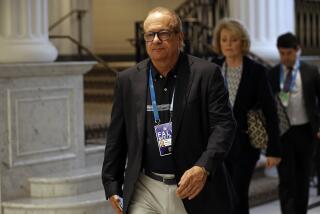Hoiles Suit to Dissolve Freedom Newspapers Finally Goes to Trial
- Share via
The final battle was joined Monday in the fight for Freedom Newspapers Inc. as opening statements began in the trial of the 5-year-old lawsuit that dissident shareholder Harry H. Hoiles has filed to dissolve the company.
The trial will determine if one branch of the Hoiles family can take one-third of the Irvine-based company’s assets and strike out on its own to carry on the libertarian tradition of company founder R. C. Hoiles.
The internal fighting that Hoiles’ lawyer called a “family tragedy” erupted in 1980 after Hoiles lost his support to become chief executive officer of the media chain. Family secrets about the events will now be bared in court, though much of the story already has been revealed.
Denying Hoiles the opportunity to succeed his brother, who died in December, 1981, as chief executive officer provided the motivation for the lawsuit, said his trial lawyer, Vernon W. Hunt Jr. of Santa Ana.
But it was the actions of his brother’s and sister’s families that provided the basis for Hoiles’ claim that the company should be dissolved and that his family should get one-third of the assets.
Hunt said the corporate actions demonstrate how the families of Mary Jane Hoiles Hardie and the late Clarence H. Hoiles were “ganging up on Harry.”
The actions of the other two family branches--each of which also owns about a third of the stock--not only ruined Hoiles’ hope of heading the company but also froze him out of company management and devalued his family’s share of the stock, Hunt said.
Guiding Philosophy
In an opening statement in the much-delayed trial, Hunt sketched a history of how founder R. C. Hoiles laid down the libertarian philosophy to guide his chain’s operations and how the majority have strayed from those teachings.
“It was a power struggle,” Hunt said. “Principle after principle was abandoned” as the families of Mary Jane Hoiles Hardie and the late Clarence H. Hoiles restricted their stock and changed bylaws without notifying the family of Harry Hoiles and abolished the position Harry coveted--chief executive officer--in favor of a ruling troika.
Defense attorneys, who will make their opening statements today, contest few of the facts in the case but challenge the minority’s interpretation of them.
“The evidence will show that any acts by the defendants were reasonable and justified under the circumstances,” said Robert E. Currie of Newport Beach, attorney for Freedom Newspapers and its president, D. Robert Segal.
What Hoiles wants is one-third of the assets of the $1-billion company, which owns the Orange County Register, 28 other dailies and five television stations. Hunt also claimed that the actions of the majority were so outrageous that substantial punitive damages should be awarded.
But the majority claims that Hoiles only owns stock in the company, not a portion of the assets. And that stock is worth only a discounted price because it was not a controlling interest and because the majority shareholders had entered into a stock restriction agreement among themselves.
Offered $74.1 Million
What Hoiles had been offered previously was $74.1 million for his family’s shares, a 73% discount on what one-third of the value of the company would have been in 1981 when Hoiles was demanding to withdraw from the company with his family’s share of the assets.
Hunt claimed that the principle of volunteerism basic to R. C. Hoiles’ libertarian values means that “each person owns himself” and that “no one may assert control without the consent of the others.”
“Therefore, the majority cannot impose its will on others,” Hunt said. “Those who dissent can withdraw--without penalty.”
Such views led the heirs of R. C. Hoiles to operate by unanimous agreement on all major issues for the decade after the patriarch died in 1970, Hunt said, and all three children came to expect that if any one of them did not agree with the majority’s actions, he or she could withdraw with the proportionate share of the assets.
In 1978, Hunt said, both Hardie and Clarence Hoiles, at different times, looked into withdrawing from the company with their shares of the assets.
It was after Hardie and her husband told Harry in late 1980 that they would not support him for chief executive officer after Clarence died that Harry decided to withdraw. And, through most of 1981, the families talked about what properties to give Harry.
Talking Business
But in August, R. David Threshie, Clarence’s son-in-law and Register publisher, proposed that the majority families, in essence, leave libertarian principles at the bank door and start talking with Harry in business terms, Hunt said.
In a letter in which he called his uncle a “spoiled child,” Threshie argued that there was no reason to kill the goose that laid the golden egg. He suggested that the company remain intact and that Harry be given a discounted price for his shares.
After that letter, the majority entered into the stock restriction agreement and took the other actions that Harry Hoiles’ family claims constitute “persistent fraud, mismanagement or abuse of authority or persistent unfairness” toward them--and reason to dissolve the company.
More to Read
Inside the business of entertainment
The Wide Shot brings you news, analysis and insights on everything from streaming wars to production — and what it all means for the future.
You may occasionally receive promotional content from the Los Angeles Times.










